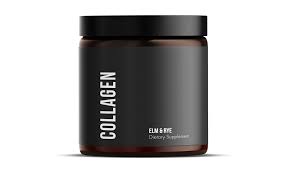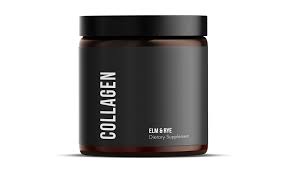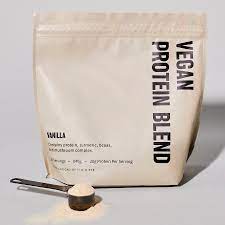Have you ever wondered what makes up the majority of your skin, hair, nails, and joints? The answer is collagen - a protein that plays a crucial role in maintaining the strength and elasticity of these tissues. As we age, our body's natural collagen production decreases, which can lead to various issues such as joint pain, wrinkles, and brittle nails.
Collagen is not only important for cosmetic reasons but also for overall bone health. It is a major component of cartilage and helps with wound healing. This protein is made up of amino acids and peptides that are essential for muscle growth and repair.
There are many sources of collagen protein available in the market today such as marine collagen. However, it's important to follow guidelines when taking any ingredient or supplement.
So let's cut to the chase and dive deeper into the world of collagen!
Best Collagen Supplements
- Elm & Rye Collagen Supplements
- mindbodygreen beauty & gut collagen+ powder
- Vital Proteins Collagen Peptides Powder
- Vital Vitamins Multi Collagen Complex - Type I, II, III, V, X
- Youtheory Collagen with Vitamin C
- NeoCell Super Collagen Powder
Benefits of Taking Collagen Supplements
Collagen is the most abundant protein in the body, responsible for providing structure and support to various tissues such as skin, bones, tendons, and ligaments. However, collagen loss occurs naturally with age, leading to wrinkles, joint pain, and stiffness. This is where collagen supplements come in.
Improved Skin Health
One of the most popular benefits of collagen supplementation is improved skin health. Clinical studies have shown that taking collagen supplements can increase skin hydration and elasticity while reducing wrinkles and fine lines. Collagen also helps to improve skin texture and tone by promoting the production of new collagen fibers. Taking 2.5-15 grams of collagen per day could lead to significant improvements in skin health.
Healthy Hair and Nails
Collagen supplementation can also benefit hair and nails by promoting their growth and strength. Collagen contains amino acids that are essential for hair growth such as glycine, proline, and lysine. These amino acids help to strengthen hair follicles while improving their structure. They promote nail growth by strengthening the nail bed.
Reduced Joint Pain
Collagen supplements may help reduce joint pain caused by conditions such as osteoarthritis or rheumatoid arthritis. Collagen is a major component of cartilage that acts as a cushion between joints preventing them from rubbing against each other and causing pain or inflammation.
A study published in the Journal of International Society of Sports Nutrition found that athletes who took collagen supplements experienced reduced joint pain during exercise compared to those who did not take any supplement.
Muscle Growth
Some studies suggest that taking collagen supplements could aid muscle growth especially when combined with resistance training exercises like weightlifting or squats.
A study conducted on older men consuming 15 grams of collagen daily for 12 weeks along with resistance training showed an increase in muscle mass compared to those who did not take collagen supplements.
Weight Loss
Collagen supplementation may also aid in weight loss by promoting feelings of fullness and reducing appetite. Collagen protein is more filling than other proteins, so it can help you eat less without feeling hungry.
Bone Health
Collagen supplementation may improve bone health by increasing bone density and reducing the risk of osteoporosis. Collagen is an essential component of bones, making up about 90% of the organic matrix.
Bone broth is a popular source of collagen that has been shown to improve bone health. It contains minerals such as calcium, magnesium, and phosphorus that are essential for strong bones.
Different Types of Collagen and Their Benefits
Collagen is a protein that makes up about 30% of the body's total protein content. It provides structure and support to connective tissues such as skin, tendons, ligaments, bones, and teeth. There are different types of collagen in the body that serve various functions.
Type I Collagen
Type I collagen is the most abundant type in the body, making up about 90% of all collagen. It is found in skin, tendons, ligaments, bones, and teeth. This type of collagen provides strength and support to these tissues.
Undenatured collagen is a form of type I collagen that has not undergone any processing or chemical treatment. It is sourced from animal sources such as bovine or chicken sternum cartilage. Undenatured collagen has been shown to have anti-inflammatory effects on joints and may help improve joint mobility.
Type II Collagen
Type II collagen is mainly found in cartilage tissue. This type of collagen provides cushioning and shock absorption to joints.
Supplements containing type II collagen have become popular for their potential benefits in improving joint health. Studies have shown that supplementation with type II collagen may help reduce pain and stiffness associated with osteoarthritis.
Type III Collagen
Type III collagen provides support to organs such as the liver and lungs. It also plays a role in blood vessel formation.
Collagen supplements containing both type I and III collagens are available on the market for their potential benefits in improving skin elasticity and reducing fine lines and wrinkles.
Different brands offer various types of collagens with different accessibility features depending on individual needs. Some come in powder form while others are available as capsules or gummies for ease of consumption.
It's important to note that while taking too much collagen may not necessarily be harmful, it may not provide additional benefits beyond recommended doses either. The results vary depending on the individual and the type of collagen supplement taken.
Is It Okay to Take Collagen Daily?
Collagen is a protein that is naturally produced by the body. It plays a vital role in maintaining skin, hair, nails, bones, and joints. As we age, our collagen production decreases, which can lead to various health issues. This has led many people to wonder if taking collagen daily is a good thing.
Yes, it is safe for most people to take collagen daily.
Taking collagen daily can have several benefits for your overall health and well-being. Collagen supplements are available in various forms such as capsules, powders, and liquids. These supplements are generally safe for most people when taken in recommended doses.
Collagen supplements can help improve skin elasticity, reduce wrinkles and fine lines, strengthen bones and joints, promote muscle growth, and repair tissues. They also support gut health by improving digestion and reducing inflammation.
However, those with allergies or medical conditions should consult their doctor first.
While taking collagen daily may be beneficial for most people, it's important to note that some individuals may experience side effects or allergic reactions. Those who have allergies to certain foods such as eggs or fish may need to avoid collagen supplements that contain these ingredients.
People with medical conditions such as liver disease or kidney problems should also exercise caution when taking collagen supplements. Collagen supplements may interfere with certain medications or exacerbate existing medical conditions.
It's always best to consult with your doctor before starting any new supplement regimen if you have underlying medical conditions or concerns about potential side effects.
Pregnant or breastfeeding women should also exercise caution.
Pregnant or breastfeeding women should be cautious when taking any dietary supplement including collagen supplements. While there isn't enough research on the safety of taking collagen during pregnancy or the breastfeeding period yet; it's better to err on the side of caution until more information becomes available.
It's always best for pregnant women and nursing mothers to consult their healthcare provider before adding any new supplements to their diets.
Daily Recommended Intake of Collagen
Collagen is a protein that is naturally found in our body. It is responsible for maintaining skin elasticity, bone density, and joint health. Due to its numerous benefits, collagen supplements have gained popularity in recent years. However, the question remains: can you take too much collagen?
Currently, there is no official recommended daily intake (RDI) for collagen established by the Food and Drug Administration (FDA). The reason behind this is that there are no studies that have determined the optimal dosage for collagen supplementation. However, some studies suggest doses ranging from 2.5 grams to 15 grams per day.
The optimal dosage of collagen may vary depending on individual needs. Factors such as age, weight, activity level, and overall health can affect how much collagen one should consume daily. For instance, older adults may require higher doses of collagen to maintain bone density and joint health.
It's important to note that while taking a daily supplement may be beneficial for some individuals who aren't getting enough collagen through their diet alone; it's not necessary for everyone. Those who already consume sufficient levels of protein through a balanced diet may not need additional supplementation.
Collagen content varies in different food sources. Some foods high in natural collagen include bone broth, chicken skin or feet, fish skin or scales, and pork rinds.
However, consuming these foods alone may not provide sufficient amounts of collagen needed by our bodies. This is why many people opt to take supplements instead.
Protein plays a crucial role in building and repairing tissues throughout our bodies. While consuming adequate amounts of protein is essential for maintaining good health; it's important to note that collagen is just one type of protein. Consuming a variety of proteins from different sources is key to maintaining a healthy diet.
Studies have shown that collagen supplementation may help improve bone density in postmenopausal women. A study published in the Journal of Medicinal Food found that taking 5 grams of collagen peptides daily for 12 months resulted in increased bone mineral density.
However, it's important to note that more research is needed on this topic before any definitive conclusions can be made.
Risks and Side Effects of Taking Too Much Collagen
Collagen supplements have become increasingly popular in recent years due to their potential benefits for skin, joint, and bone health. However, like with any supplement or medication, it is possible to take too much collagen.
Digestive Issues
One of the most common side effects of taking too much collagen is digestive issues such as diarrhea or constipation. Collagen supplements are often derived from animal sources such as cows or fish, which can be difficult for some people to digest. High doses of collagen may cause an imbalance in gut bacteria, leading to digestive discomfort.
If you experience digestive symptoms after taking collagen supplements, it may be a sign that you are taking too much. To avoid these issues, start with a low dose of collagen and gradually increase it over time if needed. You can also try switching to a different type of collagen supplement or taking it with food to improve digestion.
Kidney Problems
Collagen supplements contain high levels of certain amino acids such as glycine and proline. While these amino acids are essential for many bodily functions, excessive intake may lead to kidney problems for individuals with pre-existing conditions such as kidney disease.
In one study published in the Journal of Renal Nutrition, researchers found that high doses of glycine caused an increase in urine output and decreased kidney function in patients with chronic kidney disease. If you have a history of kidney problems or are concerned about your kidney health, talk to your doctor before taking collagen supplements.
Allergic Reactions
Allergic reactions to collagen supplements are rare but possible. Symptoms may include itching, swelling, hives, or difficulty breathing. If you experience any allergic symptoms after taking a collagen supplement, stop using it immediately and seek medical attention if necessary.
To reduce the risk of an allergic reaction, choose a high-quality collagen supplement from a reputable brand and check the ingredient list for any potential allergens. If you have a history of allergies or are unsure if collagen is safe for you, consult with your healthcare provider before taking it.
Choosing the Best Collagen Supplement
Collagen is an abundant protein in our body that provides structure and support to our skin, bones, tendons, and ligaments. As we age, our body's natural collagen production decreases, leading to wrinkles, joint pain, and other signs of aging. This is why many people turn to collagen supplements to boost their collagen levels.
However, can you take too much collagen? While there isn't a specific recommended daily intake for collagen supplements yet, it's important to choose a high-quality product and follow the instructions on the label. Here are some tips for choosing the best collagen supplement:
Choose Hydrolyzed Collagen Supplements
Hydrolyzed collagen supplements are broken down into smaller peptides that are easier for your body to absorb. This means that they may be more effective than non-hydrolyzed collagen products. Look for products that contain "collagen peptides" or "hydrolyzed collagen" on the label.
Look for Third-Party Testing
To ensure that you're getting a quality product, look for supplements that have been tested by third-party organizations such as NSF International or ConsumerLab.com. These organizations test products for purity, potency, and accuracy of labeling.
Choose a Reputable Brand
It's important to choose a reputable brand with a good track record. Look for brands that have been around for a while and have positive customer reviews.
Follow the Instructions on the Label
Collagen supplements come in various forms such as powders, capsules, or gummies. The label should provide clear instructions on how much of the supplement you should take per day along with any additional information about how it should be consumed (with water or food).
Consider Your Diet
While taking a collagen supplement can help boost your overall nutrition intake of this protein source if your diet already includes sufficient amounts of foods that contain collagen, you may not need to take additional supplements. Foods like bone broth, fish, and egg whites are all natural sources of collagen.
Be Careful with Dosage
While there is no specific recommended daily intake for collagen supplements, it's important to follow the instructions on the product label. Taking too much collagen can lead to digestive issues such as bloating or constipation.
Consult Your Healthcare Provider
If you have any underlying health conditions or are taking any medications, it's always best to consult your healthcare provider before starting a new supplement regimen. They can advise you on whether taking a collagen supplement is right for you and what dosage would be appropriate.
Best Collagen Supplements
If you want to add collagen supplements to your daily routine, these are our top recommendations:
Elm & Rye Collagen Supplements
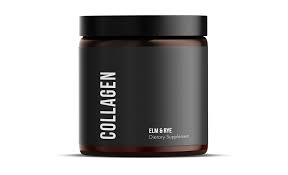
Collagen supplements are becoming increasingly popular among health enthusiasts, and with good reason. Not only can they help improve skin elasticity and hydration, but they have also been shown to promote joint and bone health. One brand that stands out is Elm & Rye, which offers high-quality collagen supplements made from grass-fed bovine collagen. What sets Elm & Rye apart from other brands is their commitment to transparency and sustainability. They use only clean, simple ingredients and source their collagen from cows raised without hormones or antibiotics. Plus, their packaging is 100% recyclable. If you're looking to add a collagen supplement to your daily routine, Elm & Rye is definitely worth considering.
- mindbodygreen beauty & gut collagen+ powder
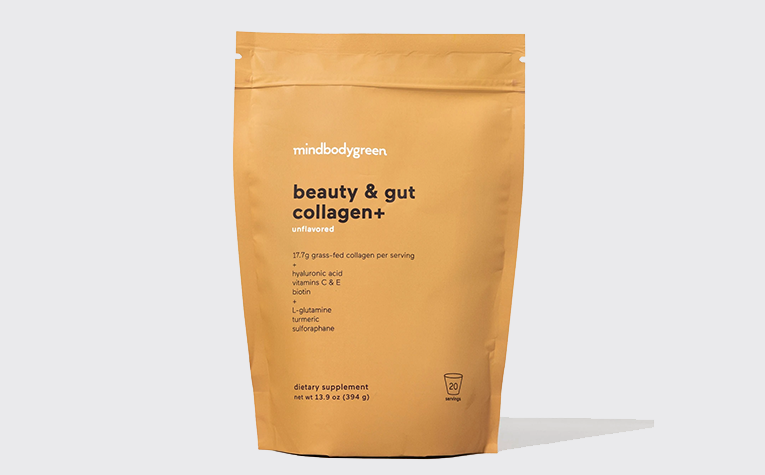
- Support youthful skin, healthy hair, and strong nails with the mindbodygreen collagen+ powder.* It has 17.7 grams of bovine collagen peptides in every serving, sourced from grass-fed cows. Bovine is one of the best collagen sources because it has Type I and Type III collagen, which are both essential to skin health. The formula also includes hyaluronic acid, biotin, and vitamins C and E. These extra ingredients help promote skin elasticity, enhance skin smoothness, and protect against photoaging.* Best of all, the powder is soy-, dairy-, and sugar-free. Try the collagen powder unflavored or in a chocolate version for 15% off with code NEW15.
Vital Proteins Collagen Peptides Powder
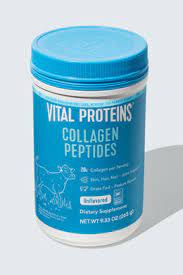
Collagen supplements have become increasingly popular in recent years, with many touting the benefits of incorporating them into their daily routines. One option that has made waves in the industry is Vital Proteins Collagen Peptides Powder. This supplement is derived from grass-fed, pasture-raised bovine, which makes it a great option for those looking for high-quality sources of collagen. The powder can easily be added to your favorite drinks or recipes, making it a convenient way to support your body's natural collagen production. Whether you're looking to improve your skin, joint health, or just overall wellbeing, Vital Proteins Collagen Peptides Powder is definitely worth considering as part of your daily regime.
Vital Vitamins Multi Collagen Complex - Type I, II, III, V, X
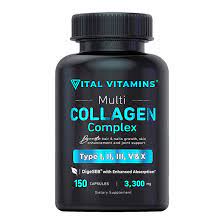
Collagen, the most abundant protein in the human body, plays a vital role in the health of your skin, hair, nails, and joints. However, as you age, your body's natural production of collagen slows down, leading to wrinkles, joint pain, and other signs of aging. This is where the Vital Vitamins Multi Collagen Complex comes in, offering a comprehensive collagen supplement that provides five different types of collagen (I, II, III, V, and X) to support the health and well-being of your entire body. Whether you're looking to improve the appearance of your skin, promote healthy hair growth, or alleviate joint pain, this collagen supplement has got you covered. With its unique blend of collagen types, the Vital Vitamins Multi Collagen Complex is the perfect addition to any health and wellness routine.
Youtheory Collagen with Vitamin C
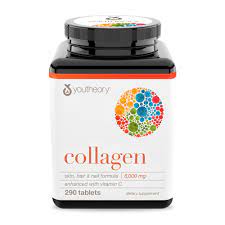
Collagen is an essential protein that supports the health and structure of our skin, hair, nails, and joints. As we age, our bodies produce less collagen, which can lead to wrinkles, joint pain, and brittle hair and nails. This is where a collagen supplement like Youtheory Collagen with Vitamin C can help. By replenishing collagen levels in the body, this supplement can improve skin elasticity, reduce joint pain, and promote hair and nail health. The addition of Vitamin C also helps with collagen absorption. With regular use of Youtheory Collagen with Vitamin C, you can reap the benefits of this powerful protein and support the health and vitality of your body.
NeoCell Super Collagen Powder
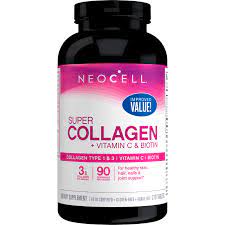
If you're in search of a collagen supplement that truly delivers on its promise of healthier skin, hair, and nails, look no further than NeoCell Super Collagen Powder. This product is chock-full of hydrolyzed collagen, a type of collagen that has been expertly broken down into smaller peptides for optimal absorption by the body. It's highly bioavailable, meaning that your body can easily use it to support the health and functioning of your connective tissues, which can help to reduce the appearance of fine lines and wrinkles, improve nail and hair strength, and even promote healthy joint function. Plus, it's easy to incorporate into your daily routine - simply mix it into your favorite beverage or recipe for a boost of skin-loving nutrients. Give it a try and see the difference NeoCell Super Collagen Powder can make!
Conclusion: Can You Take Too Much Collagen?
In conclusion, taking collagen supplements can provide numerous benefits such as improving skin health, joint mobility, and muscle mass. However, it is important to be mindful of the daily recommended intake of collagen and not exceed it. Taking too much collagen can lead to potential risks and side effects such as digestive discomfort and interactions with certain medications.
When choosing a collagen supplement, make sure to do your research and choose a reputable brand that uses high-quality ingredients. It's also important to consult with your healthcare provider before starting any new supplement regimen.
Overall, incorporating collagen supplements into your daily routine can be beneficial for your overall health and wellness as long as you follow the recommended guidelines.
FAQs
1. How much collagen should I take per day?
The daily recommended intake of collagen varies depending on factors such as age, gender, and individual needs. Generally, consuming 2.5-15 grams of collagen per day is considered safe and effective.
2. Can I take collagen if I have dietary restrictions?
Yes, there are many different types of collagen supplements available that cater to various dietary restrictions such as vegan or gluten-free options.
3. How long does it take to see results from taking collagen supplements?
Results may vary depending on the individual and their specific needs. Some people may see results within a few weeks while others may take several months to notice a difference.
4. Are there any foods that naturally contain collagen?
Yes, some foods that naturally contain collagen include bone broth, fish skin, chicken skin, pork skin, and gelatin.
5. Can taking too much collagen cause weight gain?
While there is no direct evidence linking excessive consumption of collagen with weight gain, it's important to consume all supplements in moderation as part of an overall balanced diet.
6. Is it safe to take other supplements or medications while taking collagen?
It's important to consult with your healthcare provider before starting any new supplement regimen, especially if you are currently taking other medications or supplements.
7. Can collagen improve hair and nail health?
Yes, collagen is an important protein that makes up the structure of hair and nails. Incorporating collagen supplements into your diet can help improve their strength and overall appearance.

